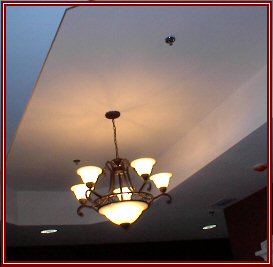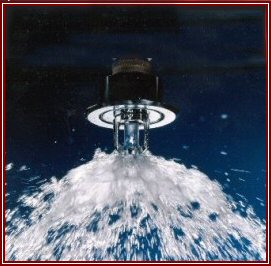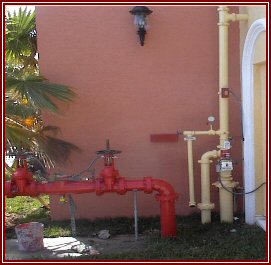How to be Safe and Not Get Burned
Commercial, industrial and multi-residential buildings all require fire prevention sprinkler systems. Recently there has been a push by fire marshals, fire fighters, and fire protection professionals to include residential homes in that requirement status as well. No matter where you are during the day, a fire protection system affects your life. Whither you’re at work, in a high-rise building, or you have kids in school, a fire protection system is resting overhead and hopefully will never be needed.
 Fire sprinkler contractors are generally listed in the Yellow Pages under “Fire Sprinklers,” or “Sprinklers”. It is always better if you know someone who has recently installed sprinklers in their building and can refer you to a contractor. If you are starting from scratch, general caution is in order.
Fire sprinkler contractors are generally listed in the Yellow Pages under “Fire Sprinklers,” or “Sprinklers”. It is always better if you know someone who has recently installed sprinklers in their building and can refer you to a contractor. If you are starting from scratch, general caution is in order.
This article has been written to prepare a building owner or property manager with information necessary to evaluate fire prevention/protection contractors. By knowing a few basic questions you can ensure a fire protection contractor has the proper background, experience, qualifications and certifications for designing, installing, maintaining and inspecting a fire sprinkler system in your building.
One of the most critical decisions for a building owner or property manager is hiring a skilled, qualified and certified fire protection contractor. If the sprinkler system fails or does not adequately suppress a fire, the results can be devastating, from the loss of human life to a great financial impact.
Improper design, failure to meet standards, inadequate coordination with architects, builders and fire marshals can all impact your business. These failures can cause costly delays, additional fees and perhaps even create local or state imposed fines. Include poor workmanship, inferior materials or improper installation and your sprinkler system could cost you more in service and repair long after your contractor has left the building.
The typical failures include water leaks, which can damage your company’s assets, impact the environment or create other hazards for your tenants during installation. Leaks can also impact the performance of your fire protection system causing serious failures when it’s needed the most.
A properly designed and installed fire protection system will dependably serve your building for many decades. The decisions made today can and often do affect a building and its tenants throughout the life of the building itself. A qualified contractor can help you through the process and ensure that standard is meet.
In state owned property there is a requirement that building systems be built with the intention of lasting for 50 or more years. We have personally serviced sprinkler systems that have been in service for more than a century.
Background and Reputation
Background and reputation are the two most important pieces of information you can gain from a contractor. Many fire protection companies are more than willing to provide you with information about their qualifications, certifications and license information. But unless you double-check that information, it could just be words on a page. Every state has a licensing agency for contractors. For fire prevention/protection companies, the State Fire Marshal’s office is usually the authoritative agency. Today, these agencies typically maintain a database of currently licensed companies on their websites. You can search for the companies and verify their licenses. You may also take time to verify the certifications required by the state in order to be licensed. This can help you verify the claims of certification as well.
Check our Links page for licensing information on Virginia, North Carolina, South Carolina, Georgia and Tennessee.
Check with your local Better Business Bureau for any compliments, complaints or litigation issues that may exist for the company. You can find most of this information online as well.
One of the best sources for checking out a contractor is through their reputation with other customers. Consider calling other building owners or property managers and asking if they worked with the contractor before and what their customer experience was with that company.
Consider drafting your own contractor questionnaire and require detailed responses for any legal or regulatory actions taken against them. These should include:
- All litigation within the past 5 years
- OSHA/EPA citations
- Outstanding judgments or claims
Consider requesting the resumes of the top personnel within the company. Ascertain the sum of their combined years of experience and the depth or range of experience. Are their personnel experienced in all aspects of design, installation and inspection of sprinkler systems? Having cross over experience could be a great asset as it provides a full scope of understanding when working on your project.
What is their turnover rate? A company with high turnover could be a sign of unprofessional or unscrupulous practices. On the other hand, a business built on multiple generations and family pride often demonstrates stability and sound practices.
Design
Your sprinkler project should begin with the contractor’s estimator and if possible also the contractor’s designer who will be in charge of the project. Planning and design require precise measurements, understanding of installation and performance, and is the foundation for quality throughout the contracting project.
 You don’t want just anybody handling this responsibility. An experienced, trained designer or technician is essential to the project. You want someone with a professional designation or degree that speaks to the integrity and quality of their drawings. This could be certification from NICET, the National Institute for Certification in Engineering Technologies. But not all states utilize NICET and instead rely on their testing and certification process. You need to know what your state requires and if your contractor has met those qualifications.
You don’t want just anybody handling this responsibility. An experienced, trained designer or technician is essential to the project. You want someone with a professional designation or degree that speaks to the integrity and quality of their drawings. This could be certification from NICET, the National Institute for Certification in Engineering Technologies. But not all states utilize NICET and instead rely on their testing and certification process. You need to know what your state requires and if your contractor has met those qualifications.
In both North and South Carolina NICET level III certification is required for preparation of shop drawings.
You might also inquire about the range of experience of your designer. Have they installed pipe before? If so, for how long. Some of the best designers are people who have actually done the job they’re designing for. Does the designer understand your business and its unique requirements. For instance, a designer with a scientific background who know how to read the recycle codes on plastic has a jump on others when designing a sufficient system for a storage building filled with plastics.
When a building already exists, a designer won’t just rely on the original architectural drawings. As a building is physically created, small variations in the design may occur during construction. These can impact your sprinkler design. An experienced designer will include a survey of the building to ensure an accurate design of your new or modified sprinkler system. Check the experience of your designer to determine if they provide this service, and if so, how do they perform the service. For instance, do they rely on visual inspection, tape measures and existing drawings? Or do they come with professional equipment that provides them with accurate measuring and inspection. How do they assess storage, arrangement, and commodity. Each of these can impact not just a survey, but also the design and installation.
Materials
One of the biggest risks of going with the lowest bid is that you get what you pay for. Often, this means cheaper, inferior parts that may serve you adequately for the short-term, but create long-term breakdowns. And bringing back the contractor to replace what’s broken or defective is always more costly than paying the price for quality up front.
Quality products can be identified by the stamps and approvals of UL (Underwriters Laboratories) and FM (Factory Mutual). ANSI (American National Standards Institute) is the approval authority for pipe, including pressures and hydraulic flows, to ensure proper performance.
Some companies insist on domestically produced materials. Nothing wrong with that, but keep in mind domestically produced materials are very expensive. All materials used in construction of fire systems must meet the standards set by ANSI, and most will also meet the standards set by UL and FM as well. There are more that meet UL than FM, but it’s rare not to see both stamps on a device
Quality Control
 Quality control covers a broad range of topics during the design and construction of a fire protection system. One of the first questions to ask a potential contractor is what installation standard they use and how much experience they have with that standard.
Quality control covers a broad range of topics during the design and construction of a fire protection system. One of the first questions to ask a potential contractor is what installation standard they use and how much experience they have with that standard.
In the U.S, the National Fire Protection Association (NFPA) sets industry standards. These standards are specific to commercial, industrial, multi-residential and private home construction. Determine how much experience the contractor has with the appropriate standards that are specific to your needs. For instance if you’re looking for a contractor to install a system in a residential home they should refer to Standard 13D, usually referred to as NFPA 13D. This covers both site-built and manufactured homes. If they refer to NFPA 13 or 13R, keep shopping. Your contractor should know exactly what’s required for your building, regardless of what type of building that is.
Additionally, the contractor should be working with the most current version of the standards. NFPA updates various standards throughout the year. While most authorities having jurisdiction over your building may not adopt changes to the standards for several years, your contractor should be aware of changes and be prepared to incorporate them immediately.
Quality doesn’t stop at the design table. Contractors who assign a project manager to your installation have better control over quality than those who give a haphazard oversight on the construction site. It doesn’t matter if the company is small or large, a single project manager is vested in providing you with the best quality in order to maintain or even build their reputation in the industry. Seeing the job through to the end, working with other contractors, the fire marshal and understanding the stages of installation, inspection and approvals all contribute to the quality control of any project.
Pricing
The next factor to choosing a contractor is pricing. Sometimes the lowest bid isn’t always the best bid. Especially if it’s exceptionally low. The first question you should ask is, why is their price so low, what are they missing that the others are including? Taking the lowest bid could result in a costly change order to the contract to include what was missed. An experienced contractor generally won’t do this, as they rarely miss something in the bid.
Most contractors will come to you and look over the job before giving you a quote. This initial survey of the project allows them to review the work site, the existing plans, evaluate and apply the necessary NFPA standards before providing a quote.
Another factor affecting price is competition. In areas with a lot of sprinkler work exists, the costs are about one half that of areas with fewer installations. One caveat, though. If there is a lot of work but not enough contractors, a higher quote might be provided for new work because they already have all the jobs they can handle or they view new jobs as supply and demand. If there is a lot of demand, but few to provide the service, some contractors may think their services are more valuable. If you suspect this is the case in your area, consider looking at contractors outside your area, or perhaps even outside your state. Just ensure the out of state contractor is licensed to do work in your state.
Specialization is another factor. Contractors who have experience in single-family residential work may provide lower quotes than other sprinkler contractors who do not have this experience. For one thing, they have learned efficiencies that cut both installation time and materials. And they’re able to pass those savings on to their customers.
Lastly, prices will depend upon the prevailing labor rates in your area. If you live in an area with relatively high or low labor rates, then this will be reflected in bids on residential sprinklers.
Finally
Your thorough review and selection of the right fire protection contractor will create significant value and quality of your sprinkler system.
HFP has designed several commercial, industrial and residential sprinkler systems for our clients. We have the knowledge and experience to help you lay out a plan and design a system that’s right for your business or home. You can learn more about HFP, our experience and services by visiting our Home page or calling us at 704.877.2553
 © 2012 HFP / HFirePro.com / Holland Fire Protection, LLC. All Rights Reserved.
© 2012 HFP / HFirePro.com / Holland Fire Protection, LLC. All Rights Reserved.
Duplication of any material, in whole or in part, is strictly prohibited.
You must be logged in to post a comment.